
The stakes are immense. The political battle is about control. Each Shiite party wants power in Baghdad, the so-called mid-Euphrates provinces, Najaf and Karbala, which are home to Shiite Islam's holiest sites, and the southern province Basra with its vital oil resources and maritime facilities.
"The only thing that [the parties] agree on is remaining in power and confronting one another. There is a negative meeting point, and that's not enough to build a government," says Mr. Dawod.
More than two years since their ascent to the helm for the first time in Iraq's modern history, Shiites have proven that the UIA is little more than a pragmatic marriage of convenience. So far, they have failed to transcend differences and reach out to the country's other communities, mainly the embattled Sunni Arabs.
"There is a great failure by the government," says Dawod. "And unfortunately, because of the situation in Iraq now, this failure does not lead to an alternative government coming to power but more chaos."
But Faleh Jabar, another Iraq expert, says he believes Maliki, who is under tremendous pressure from Washington to deliver on a number of benchmarks that are primarily aimed at promoting reconciliation and resuscitating the economy, may survive the withdrawal of the Sadrists. They held six cabinet posts: health, transport, agriculture, tourism, civil society, and provincial affairs.
"It's possible if the Kurds and [SCIRI] go on supporting him," says Mr. Jabar, director of the Beirut-based Iraqi Institute for Strategic Studies. "And if the Sunnis feel that Maliki is dealing with security in a fair-handed manner."
The Americans refused to listen to Alber's pleas. We went all around the mosque and the adjacent madrassah, the Imam Aadham Islamic College. We saw dozens of doors broken down, windows broken, ceilings ripped apart, and bullet holes in walls and ceilings. The way the soldiers searched for illicit arms in the ceiling was first to spray the ceiling with gunfire, then break out a panel and go up and search.
"The only thing that [the parties] agree on is remaining in power and confronting one another. There is a negative meeting point, and that's not enough to build a government," says Mr. Dawod.
More than two years since their ascent to the helm for the first time in Iraq's modern history, Shiites have proven that the UIA is little more than a pragmatic marriage of convenience. So far, they have failed to transcend differences and reach out to the country's other communities, mainly the embattled Sunni Arabs.
"There is a great failure by the government," says Dawod. "And unfortunately, because of the situation in Iraq now, this failure does not lead to an alternative government coming to power but more chaos."
But Faleh Jabar, another Iraq expert, says he believes Maliki, who is under tremendous pressure from Washington to deliver on a number of benchmarks that are primarily aimed at promoting reconciliation and resuscitating the economy, may survive the withdrawal of the Sadrists. They held six cabinet posts: health, transport, agriculture, tourism, civil society, and provincial affairs.
"It's possible if the Kurds and [SCIRI] go on supporting him," says Mr. Jabar, director of the Beirut-based Iraqi Institute for Strategic Studies. "And if the Sunnis feel that Maliki is dealing with security in a fair-handed manner."
Jabar explains that more Sunnis could gravitate toward Maliki if they genuinely feel that he is targeting militias implicated in sectarian killing, namely Sadr's Mahdi Army.
By Sam Dagher, Correspondent of The Christian Science Monitor
By Sam Dagher, Correspondent of The Christian Science Monitor
BREAKING THE HEARTS AND INSULTING THE MIND OF THE IRAQI PEOPLE:
Issam Rashid, chief of security for the mosque, told us the story. At 3:30 am on Sunday morning, 100 American troops raided the mosque, looking for weapons and resistance fighters. They started the raid the way they virtually always do -- by smashing in the gates with tanks and then driving Hummers in. The Hummers ran over and destroyed some of the stored relief goods (the bulk of the goods had already been sent to Fallujah -- over 200 tons -- but the amount remaining was considerable). More was destroyed as soldiers ripped apart sacks looking for rifles. Rashid estimated maybe three tons of supplies were destroyed. We saw for ourselves some of the remains, sacks of beans ripped apart and strewn around.
The mosque was full of people, including 90 down from Kirkuk with the Red Crescent, arranging for further aid to Fallujah. They were all pushed down on the floor, with guns put to the backs of their heads. Another person associated with the mosque, Mr. Alber, who speaks very good English, told us that he repeatedly said, "Please, don't break down doors. Please, don't break windows. We can help you. We can have custodians unlock the doors." (Alber, by the way, was imprisoned by Saddam for running a bakery. As he said, "Under the embargo, you could eat flour, you could eat sugar, you could eat eggs, all separately. But mix them together and bake them and you were harming the economy by raising the price of sugar and you could get 15 years in prison.)
The Americans refused to listen to Alber's pleas. We went all around the mosque and the adjacent madrassah, the Imam Aadham Islamic College. We saw dozens of doors broken down, windows broken, ceilings ripped apart, and bullet holes in walls and ceilings. The way the soldiers searched for illicit arms in the ceiling was first to spray the ceiling with gunfire, then break out a panel and go up and search.
They even went and rifled through students' exam papers. A feeble old man with a limp who is a "guard" at the mosque (actually a poor man with a large family who is given housing by the imam of the mosque) was hit in the head with a rifle butt and then kicked when he was down -- all because he was a little slow in answering the door. He says he never carries a weapon -- the whole mosque has only three Kalashnikovs, for security, kept in the imam's room (the soldiers confiscated their ammunition in the raid). And, of course, they entered the mosque with their boots on.
The American commanders will say this was a necessary precaution to make sure no military goods got into Fallujah and that this was legal under the laws of war. But the Abu Hanifa mosque was not involved in any illicit activities – nothing was found. The soldiers didn't bother to ask. They didn't go to the Imam and see if they could search to mosque. And, after a year of being stationed in Aadhamiyah, they didn't know the people well enough to know there would be nothing -- even though they were told repeatedly that the resistance in that area never fired from near the mosque because they were afraid of drawing return fire that would hit the mosque.
You can guess how many hearts and minds were won by this little operation -- the third time that the mosque has been raided since the war.
Abu Hanifa mosque has a tower that is being reconstructed. It was destroyed by the American attack during the war and is only now being finished, one year later. Rashid told me why. He said, "After the war, the Americans came and offered money to rebuild the tower. We told them no. We will rebuild the tower with our own money. We will take no money from you. You can't just destroy things and then win our goodwill by paying us off. This is not a game."
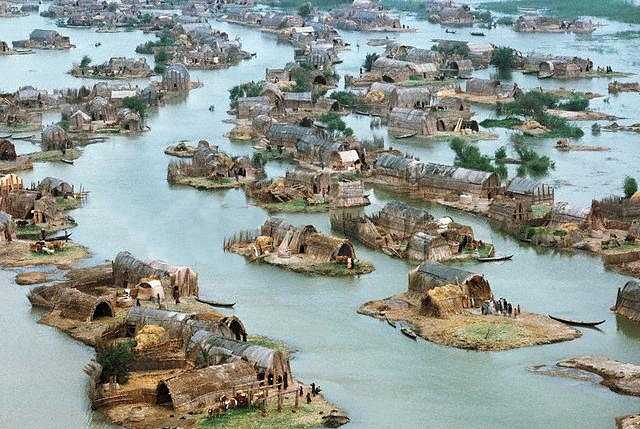
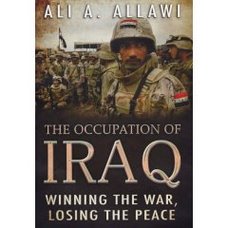
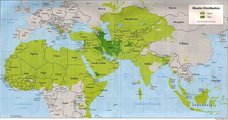
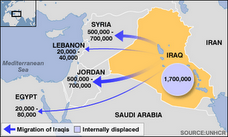
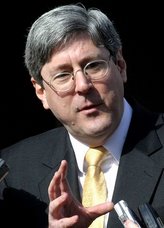
No comments:
Post a Comment